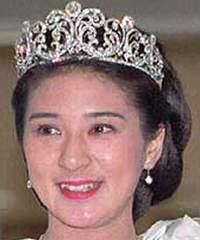Japan infuriated with new book describing crown princess as palace prisoner
Japan's government is demanding an apology from the Australian author of a new book that depicts Japan's crown princess as a "prisoner" of the imperial palace who has been bullied by bureaucrats into depression.

"Princess Masako: Prisoner of the Chrysanthemum Throne," by Ben Hills, was released by Random House in December and is billed as a biography of the 43-year-old diplomat-turned-royal, who has suffered long-standing stress-induced health problems.
In letters to the publisher and author, Japan's Foreign Ministry condemned the book as containing "disrespectful descriptions, distortions of facts and judgmental assertions with audacious conjectures and coarse logic."
"The government of Japan can by no means ignore contempt for His Majesty the Emperor ... nor contempt for other members of the Imperial family as well as the people of Japan," the letter said.
The book details Masako's life in the palace, during which she has come under grinding pressure to produce a male heir to the throne. After suffering a miscarriage in 1999, she and Crown Prince Naruhito had a daughter, Aiko, in 2001. The couple were married in 1993.
"Masako has become a prisoner of the institution she tried to reform, her health broken by the demands placed on her - suicide has been mentioned, divorce is openly discussed, the prince may even renounce his claim to the throne," Hills wrote in the preface.
The tart wording of the book - one chapter about Naruhito is titled "Mummy's Boy" - contrasts with the gentle, respectful treatment usually afforded the royal family in Japan's press. Criticizing the emperor was regarded as serious crime in the first half of the 20th century.
The Japanese government letter, signed by Japan's ambassador to Australia, Hideaki Ueda, was hand-delivered to Random House officials in Sydney on Monday, a ministry official said on condition of anonymity, citing policy.
The government took particular issue with Hills' treatment of Aiko's birth and Masako's troubled health, but officials refused to point to specific passages. The letter demanded an apology and unspecified "prompt measures."
Ueda also conveyed Japan's concerns on Monday to Peter Grey, deputy secretary of Australia's trade ministry, according to Japan's Foreign Ministry. The Imperial Household Agency also sent a similar letter of objection.
Hills said the government was trying to pressure publisher Kodansha to shelve a planned Japanese version of the book. That version is expected in several weeks, Hills said.
"The book is highly critical of the Imperial Household Agency and their role in persecuting Princess Masako, causing her to suffer severe depression," Hills wrote in an e-mail to The Associated Press. "This had not been honestly reported in Japan, and the government is obviously afraid it will lead to criticism."
Kazunobu Kakishima, editor of the Japanese edition at Kodansha Ltd., denied the government was pushing Kodansha to drop the project, though he said a release date had not been set. He refused to comment on criticism of the book.
Random House said it supports Hills.
"We are standing by our author on this," said Karen Reid, head of publicity in Australia.
Hill said the book was based on some 60 interviews. He told The Associated Press that his repeated requests for an interview with Crown Prince and Princess were never granted, the AP said.
In February 2001, a German magazine apologized to Japan for making fun of Crown Prince Naruhito's then-childless marriage. Aiko was born in December 2001.
The magazine, a supplement to the Sueddeutsche Zeitung newspaper, ran a picture showing the royal couple with "Tote Hose" - literally "dead pants," but understood in Germany as "nothing going on" - written across Naruhito's groin.
Subscribe to Pravda.Ru Telegram channel, Facebook, RSS!




